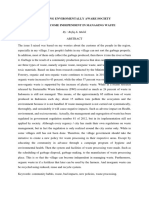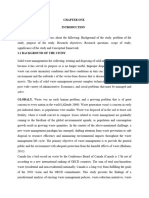Garbage Disposable Problem in Goa
Uploaded by
Snehal JoshiGarbage Disposable Problem in Goa
Uploaded by
Snehal JoshiGARBAGE DISPOSABLE PROBLEM IN GOA
SEMINAR ON GENERAL TOPICS
7/7/2012 GROUP 5
SOME FACTS & FIGURES
Goas homes produce 300 tonnes of garbage daily. More bio-medical waste comes from the hospitals and nursing homes. But most of this waste some of it potentially hazardous to the environment is dumped all over the state without any regard to the norms, some of which are a decade old. Only five towns panaji, bicholim, mormugao, canacona and margao have dumping grounds right now and these, too, are more than 75 per cent full. we are staring at a real problem, environmentalist clinton vaz said. even these towns, which have dumping grounds, are operating without safety precautions. They should be closed down and remedial measures should be taken immediately, he added. The other towns and villages do not even have a dumping ground; waste is dumped wherever possible, often in rivers and the backwaters, resulting in these water bodies choking and causing floods during the monsoon. The bio-medical waste that goas healthcare centres produce top the list of environmental concerns. Only goa medical college and hospital has the wherewithal to dispose of biomedical waste properly right now; it treats its own waste and that which comes from the two district hospitals (asilo hospital in mapusa and hospicio hospital in margao). But this does not take into account the tonnes of bio-medical waste generated by goas 19 government primary health centres and 123 private nursing homes and hospitals. The phcs dump their waste on their premises itself. Most of the private hospitals and nursing homes do the same or dispose of the waste with the other garbage that goes to municipality dumps; and not one of goas towns has the wherewithal to segregate biomedical waste from other waste. This is extremely dangerous for goans and goas environment, say experts.
CONSEQUENCES
Bio-medical waste, if not treated properly, can lead to disease outbreaks. Toxic waste can contaminate the water table during monsoon. Garbage is often burnt and the fumes can cause rashes and respiratory problems. Environmental activist patricia pinto agreed: the toxic waste seeping into the groundwater can contaminate wells. Environmentalists are not painting an unnecessarily nightmarish picture; this has already happened in curca. Garbage from both panaji and mapusa was being dumped in a land-fill site there without being treated. The site soon overflowed with garbage it was meant to take garbage only from panaji and it started to be burnt. Very soon, the inevitable happened; waste seeped into the ground, contaminating wells and destroying fields. Residents there now drink tanker water. The curca problem has had a direct consequence. No town or village now wants a dump in its backyard and the administration has had a tough time scouring for vacant areas for land-fill sites for garbage. Its extremely sad that compliance has not been achieved despite the high court of bombay at goa directing the state director of health services to ensure that establishments covered by the
bio-medical waste management and handling rules-1998 complied with the rules in six months.
WHO IS RESPONSIBLE?
Goans, living in a smaller state, with higher than national education levels, are already aware about the biggest environmental problems facing goa today. Thanks to higher awareness levels of emerging problems, we now see goan's immediately reporting, stopping further degradation, dumping or pollution. This has often been noticed by others in india looking at goa when finding solutions to their own state problems. We are fortunate to have cleaner cities and countryside's, (only when compared to the rest of india) however, the question is, will we follow the rest of india as we seem to be doing today, or can we collectively set our state as an example for the rest of india and beyond?
there are a handful of ngos and problem of garbage disposable were beginning to be noticed. Today, almost 10 years later, those very same environmental problems have only grown to almost unmanageable proportions and led to other imbalances, which will result in further environmental degradation. While some now claim that we are at the tipping point, a few like me believe that we've already gone beyond.
when confronted with such problems, we blame, condemn and point at people we think that are responsible such as the local authorities, builders, industrialists, and the government. But rarely do we include ourselves as society in this responsibility failure.
while most of these environmental problems crept up, due to apathy by the concerned authorities and stakeholders, it was also worsened by the failure of collective society such as you and me that passed by, and did nothing to make things better or report any violations. In certain situations, such as garbage problems, we don't realize that we are the ones that generate garbage, and therefore should share some of the blame, but more importantly some of the responsibility in managing the same. We humans as a collective species really do care about the environment, but it's our lack of awareness that causes these problems. An aware citizen would do as much as he could to save the environment. The key to change therefore is combination of mindset change as well as proper awareness. Take the very relevant subject of garbage as an example: very few goans know that we already have the potential to reduce our own garbage going to disposal by 85% or more by simple waste reduction techniques such as waste separation, organic waste disposal, recycling and changing our purchase patterns. Imagine, if panjim and margao's waste (together estimated to be 90-100 metric tonnes per day) was reduced by 85%, we'd just have to worry about disposing 10-15 tonnes per day. Instable governments, red tape, and misguided decisions are the main reasons that nothing seems to happen in goa. Past and present politicians, irrespective of their political parties
have proved to be ineffective in choosing the right technology for managing of waste. This has been seen by the failure of a lot of waste treatment facilities that were either improperly selected or chosen by the amount of monetary kickbacks. Projects or plants selected in the past have often utilized foreign technology that's highly mechanized which is good in the west but not necessarily here, or not localized to goan climate and waste characteristics. Worldwide, most waste management technologies came into being after the 1960s, and continue to improve with experimental plants set up at various places in the world even today. However, history has proved that the ideal solutions for managing waste in goa are tried and tested technology that's low cost, low tech, and localized to treat waste with goan waste characteristics. It appears that civic authorities and politicians only look at environmental problems as ways to obtain money, rather than find solutions, and until then, working with the government is difficult.
SOLUTION
We have to decide to step in when the authorities have stepped out. We should not sit down and watch the destruction of our beautiful goa. Instead we have to decide to act tough and fight every pollutant that poses a threat to us. The fact that our government is doing absolutely nothing has sunk deep into us and so we have to decide to take things into our hands.
FOR EXAMPLE 3G PROJECT
On the 1st of may, 3g - goa going green , organised a beach cleanup at colva beach from 4 pm to 7 pm. 45 volunteers mainly consisting of youth from different places around margao came for the cleanup. Members of the green team, consisting of school students from benaulim also participated. They cleared up the waste starting from sernabatim to betalbatim. The majority of the garbage consisted of beedi packets and plastic carry bags and peoples old chappals. 26 such bags of trash were collected. The bags were then set aside to be collected by a government employed garbage contractor who is in charge of maintaining the garbage disposal at the beach. The main reason behind the filthy beaches is the absence of dustbins. Most of the tourists complain that they had nowhere to throw their waste and hence just leave it behind. Setting up of proper dustbins and providing for segregation of waste would go a long way in preserving our beautiful goa.
You might also like
- The Ecology of Commerce Revised Edition: A Declaration of SustainabilityFrom EverandThe Ecology of Commerce Revised Edition: A Declaration of Sustainability4.5/5 (4)
- Porters Five Forces Model Automobile Industry100% (2)Porters Five Forces Model Automobile Industry16 pages
- Omnitel Pronto Full Report On Omnitel Pronto ItaliaNo ratings yetOmnitel Pronto Full Report On Omnitel Pronto Italia8 pages
- The Zero-Waste Chef: Plant-Forward Recipes and Tips for a Sustainable Kitchen and Planet: A CookbookFrom EverandThe Zero-Waste Chef: Plant-Forward Recipes and Tips for a Sustainable Kitchen and Planet: A Cookbook4/5 (1)
- Gorakhpur City - 2031 Solid Waste Management - 0No ratings yetGorakhpur City - 2031 Solid Waste Management - 04 pages
- Waste Management: Prospects and Challenges in IndiaNo ratings yetWaste Management: Prospects and Challenges in India7 pages
- Zero Waste Living - A Complete Guide to Reducing Your Carbon FootprintFrom EverandZero Waste Living - A Complete Guide to Reducing Your Carbon FootprintNo ratings yet
- Garbage Management Collective Inputs of Over 190,000 Citizens To Government - CompressedNo ratings yetGarbage Management Collective Inputs of Over 190,000 Citizens To Government - Compressed6 pages
- Positively Green: Everyday tips to help the planet and calm climate anxietyFrom EverandPositively Green: Everyday tips to help the planet and calm climate anxietyNo ratings yet
- Waste Management: by Chandravati Koki Professor Kims ConNo ratings yetWaste Management: by Chandravati Koki Professor Kims Con32 pages
- Zero Waste Living A Guide to Sustainable and Environmentally Conscious LifestyleFrom EverandZero Waste Living A Guide to Sustainable and Environmentally Conscious LifestyleNo ratings yet
- Waste Disposal: November-March 2020 - 2021 Garbage .-Environmental Consequences and ChallengesNo ratings yetWaste Disposal: November-March 2020 - 2021 Garbage .-Environmental Consequences and Challenges7 pages
- Presentation On SWM For Diploma StudentsNo ratings yetPresentation On SWM For Diploma Students22 pages
- Waste Management Practices and Policy in IndiaNo ratings yetWaste Management Practices and Policy in India12 pages
- Callawaygolfcompanycgc-110330093402 - Callaway Golf Company Case Analysisphpapp02No ratings yetCallawaygolfcompanycgc-110330093402 - Callaway Golf Company Case Analysisphpapp0222 pages
- Consumer Behaviour Questionnaire On Buying Behaviour Towards Branded ClothsNo ratings yetConsumer Behaviour Questionnaire On Buying Behaviour Towards Branded Cloths1 page
- Interests of Both Individuals Are To Be Considered Equally, Where in Both Individuals Benefit EquallyNo ratings yetInterests of Both Individuals Are To Be Considered Equally, Where in Both Individuals Benefit Equally2 pages
- Wal-Mart: An American Original - AgendaNo ratings yetWal-Mart: An American Original - Agenda90 pages
- Consumer Behaviour Questionnaire On Buying Behaviour Towards Branded ClothsNo ratings yetConsumer Behaviour Questionnaire On Buying Behaviour Towards Branded Cloths1 page
- Totaram Transport Company Case Analysis: Done by Group 4No ratings yetTotaram Transport Company Case Analysis: Done by Group 45 pages
- Questionnaire For Brand Preference For Dairy IndustryNo ratings yetQuestionnaire For Brand Preference For Dairy Industry4 pages
- Immune System Song - Ben Kany and John BarbackNo ratings yetImmune System Song - Ben Kany and John Barback3 pages
- 2010 Edward Cording - Assessment of Excavation Induced Building DamageNo ratings yet2010 Edward Cording - Assessment of Excavation Induced Building Damage20 pages
- 34 WaterScienceandTechnology2013 duPisaniMengeNo ratings yet34 WaterScienceandTechnology2013 duPisaniMenge15 pages
- Download Complete Designing with the Mind in Mind Simple Guide to Understanding User Interface Design Guidelines 2nd Edition Johnson PDF for All ChaptersNo ratings yetDownload Complete Designing with the Mind in Mind Simple Guide to Understanding User Interface Design Guidelines 2nd Edition Johnson PDF for All Chapters38 pages
- International Journal of Sustainable EngineeringNo ratings yetInternational Journal of Sustainable Engineering12 pages
- Termasuk: Ring Blower Ex - Resun/ Setara, Cap. 0,14m3/ Min, Power 0,1 kW/220V/1Ph/50hz100% (1)Termasuk: Ring Blower Ex - Resun/ Setara, Cap. 0,14m3/ Min, Power 0,1 kW/220V/1Ph/50hz2 pages
- Ipc847e Operating Instructions EnUS en-USNo ratings yetIpc847e Operating Instructions EnUS en-US212 pages
- Commonlit They-Re-Made-Out-Of-Meat StudentNo ratings yetCommonlit They-Re-Made-Out-Of-Meat Student7 pages
- What Is An Emotion A Debate Adolphs and Lisa F Barret 2020No ratings yetWhat Is An Emotion A Debate Adolphs and Lisa F Barret 202010 pages
- Visualizing Physical Geography 1st Edition Alan H. Strahler download100% (1)Visualizing Physical Geography 1st Edition Alan H. Strahler download47 pages
- The Ecology of Commerce Revised Edition: A Declaration of SustainabilityFrom EverandThe Ecology of Commerce Revised Edition: A Declaration of Sustainability
- Omnitel Pronto Full Report On Omnitel Pronto ItaliaOmnitel Pronto Full Report On Omnitel Pronto Italia
- The Zero-Waste Chef: Plant-Forward Recipes and Tips for a Sustainable Kitchen and Planet: A CookbookFrom EverandThe Zero-Waste Chef: Plant-Forward Recipes and Tips for a Sustainable Kitchen and Planet: A Cookbook
- Waste Management: Prospects and Challenges in IndiaWaste Management: Prospects and Challenges in India
- Zero Waste Living - A Complete Guide to Reducing Your Carbon FootprintFrom EverandZero Waste Living - A Complete Guide to Reducing Your Carbon Footprint
- Garbage Management Collective Inputs of Over 190,000 Citizens To Government - CompressedGarbage Management Collective Inputs of Over 190,000 Citizens To Government - Compressed
- The Constant Economy: How to Create a Stable SocietyFrom EverandThe Constant Economy: How to Create a Stable Society
- Positively Green: Everyday tips to help the planet and calm climate anxietyFrom EverandPositively Green: Everyday tips to help the planet and calm climate anxiety
- Waste Management: by Chandravati Koki Professor Kims ConWaste Management: by Chandravati Koki Professor Kims Con
- Zero Waste Living A Guide to Sustainable and Environmentally Conscious LifestyleFrom EverandZero Waste Living A Guide to Sustainable and Environmentally Conscious Lifestyle
- The Abundance Myth: Our Environment In CrisisFrom EverandThe Abundance Myth: Our Environment In Crisis
- Waste Disposal: November-March 2020 - 2021 Garbage .-Environmental Consequences and ChallengesWaste Disposal: November-March 2020 - 2021 Garbage .-Environmental Consequences and Challenges
- Is It Really Green?: Everyday Eco Dilemmas AnsweredFrom EverandIs It Really Green?: Everyday Eco Dilemmas Answered
- Callawaygolfcompanycgc-110330093402 - Callaway Golf Company Case Analysisphpapp02Callawaygolfcompanycgc-110330093402 - Callaway Golf Company Case Analysisphpapp02
- Consumer Behaviour Questionnaire On Buying Behaviour Towards Branded ClothsConsumer Behaviour Questionnaire On Buying Behaviour Towards Branded Cloths
- Interests of Both Individuals Are To Be Considered Equally, Where in Both Individuals Benefit EquallyInterests of Both Individuals Are To Be Considered Equally, Where in Both Individuals Benefit Equally
- Consumer Behaviour Questionnaire On Buying Behaviour Towards Branded ClothsConsumer Behaviour Questionnaire On Buying Behaviour Towards Branded Cloths
- Totaram Transport Company Case Analysis: Done by Group 4Totaram Transport Company Case Analysis: Done by Group 4
- Questionnaire For Brand Preference For Dairy IndustryQuestionnaire For Brand Preference For Dairy Industry
- 2010 Edward Cording - Assessment of Excavation Induced Building Damage2010 Edward Cording - Assessment of Excavation Induced Building Damage
- Download Complete Designing with the Mind in Mind Simple Guide to Understanding User Interface Design Guidelines 2nd Edition Johnson PDF for All ChaptersDownload Complete Designing with the Mind in Mind Simple Guide to Understanding User Interface Design Guidelines 2nd Edition Johnson PDF for All Chapters
- Termasuk: Ring Blower Ex - Resun/ Setara, Cap. 0,14m3/ Min, Power 0,1 kW/220V/1Ph/50hzTermasuk: Ring Blower Ex - Resun/ Setara, Cap. 0,14m3/ Min, Power 0,1 kW/220V/1Ph/50hz
- What Is An Emotion A Debate Adolphs and Lisa F Barret 2020What Is An Emotion A Debate Adolphs and Lisa F Barret 2020
- Visualizing Physical Geography 1st Edition Alan H. Strahler downloadVisualizing Physical Geography 1st Edition Alan H. Strahler download
















































































































